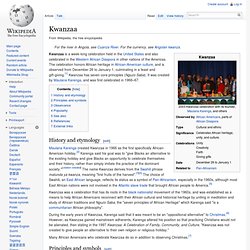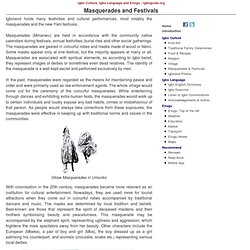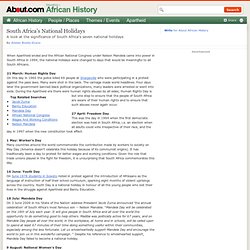

Igbo people. Kwanzaa. Kwanzaa is a week-long celebration held in the United States and also celebrated in the Western African Diaspora in other nations of the Americas.

The celebration honors African heritage in African-American culture, and is observed from December 26 to January 1, culminating in a feast and gift-giving.[1] Kwanzaa has seven core principles (Nguzo Saba). It was created by Maulana Karenga, and was first celebrated in 1966–67. History and etymology[edit] Igbo Masquerades and Festivals- Igbo Culture, Language and Enugu. Igboland holds many festivities and cultural performances, most notably the masquerades and the new Yam festivals.

Masquerades (Mmanwu) are held in accordance with the community native calendars during festivals, annual festivities, burial rites and other social gatherings. The masquerades are geared in colourful robes and masks made of wood or fabric. Some masks appear only at one festival, but the majority appears at many or all. Holidays in South Africa Explained. When Apartheid ended and the African National Congress under Nelson Mandela came into power in South Africa in 1994, the national holidays were changed to days that would be meaningful to all South Africans. 21 March: Human Rights Day On this day in 1960 the police killed 69 people at Sharpeville who were participating in a protest against the pass laws.

Many were shot in the back. The carnage made world headlines. Four days later the government banned black political organizations, many leaders were arrested or went into exile. During the Apartheid era there were human rights abuses by all sides; Human Rights Day is but one step to ensure that the people of South Africa are aware of their human rights and to ensure that such abuses never again occur.